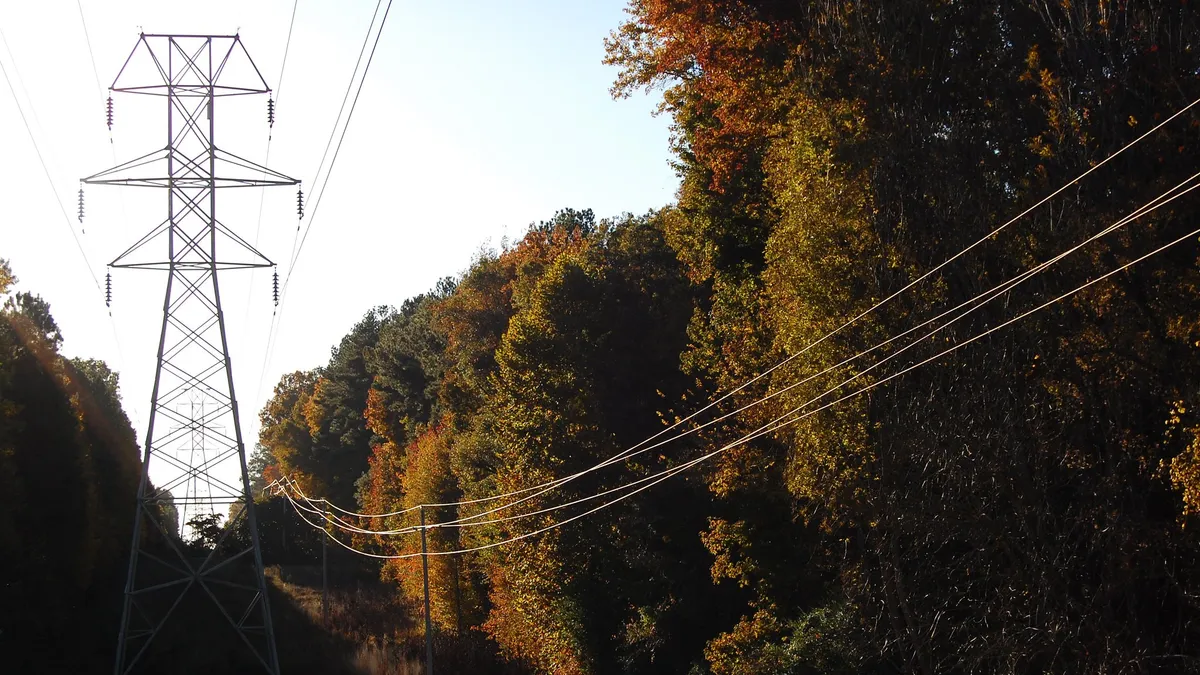Dive Brief:
-
Duke Energy Carolinas and Duke Energy Progress are proposing a local transmission planning process that includes proactive, multi-value scenario planning and expanded stakeholder engagement, according to Friday filings at the Federal Energy Regulatory Commission.
-
If successful, Duke’s proposed Carolina Transmission Planning Collaborative, called the CTPC, could be a model for other local planning processes, the Southern Alliance for Clean Energy and other stakeholder groups told FERC.
-
“The CTPC filing would vault the CTPC past its peer planning processes as one of the few, if not the only local planning process that engages in proactive, multi-value scenario planning,” the clean energy groups said. “The introduction of multi-value scenario planning and increased stakeholder responsibility will allow Duke Energy to take a more holistic approach to transmission planning.”
Dive Insight:
Duke’s proposal filed last month at FERC was driven in part by a North Carolina law that calls for cutting Duke’s carbon dioxide emissions by 70% by 2030 from 2005 levels and for the utility to be carbon neutral by 2050. In response to the law, the North Carolina Utilities Commission ordered Duke to adopt a more proactive local transmission planning process that is combined with its integrated resource plan.
Without prejudice, FERC in late December rejected Duke’s initial planning proposal over a $5 million threshold for projects to be considered in the planning process, which the commission said violated its transmission planning rules. Not including the cost threshold, FERC said Duke’s proposal appeared to be just and reasonable.
Duke’s latest proposal reflects FERC’s initial decision. It asked that the proposal be allowed to take effect March 13.
A coalition that includes Appalachian Voices, Carolinas Clean Energy Business Association, North Carolina Sustainable Energy Association, Sierra Club, South Carolina Coastal Conservation League and the Southern Alliance for Clean Energy told FERC it supports Duke’s plan.
“As many — including this Commission — have noted, a changing resource mix, growing demand, increasingly frequent extreme weather events, and a host of other transformative changes will require a modernized transmission grid,” the stakeholders said. “Achieving that goal on a least-cost basis necessitates a new approach to transmission planning and expansion.”
Duke's proposal marks a change from its siloed approach to local transmission planning, which separately assesses and addresses transmission needs driven by reliability, economics and public policy, according to the groups. The new approach would identify solutions that meet all three categories, “ensuring a more efficient, cost-effective, and broadly beneficial portfolio of transmission upgrades,” they said.
The proposed process uses scenario planning to assess a range of plausible scenarios and factors, such as different demand levels, to determine a set of “least-regrets” projects, the groups said.
Also, stakeholders, through a transmission advisory group, will be able to propose benefit metrics and a time horizon for the planning study that balances confidence in input values with the foresight that long-lead transmission projects require, according to their comments.
Transmission planning in North Carolina is evolving in response to the state’s changing resource mix, according to a joint filing by the NCUC and the NCUC Public Staff, a separate agency that represents ratepayers.
“To ensure that customers in North Carolina pay just and reasonable rates that reflect only the costs caused by those customers, planning and investment by utilities in North Carolina must be laser-focused on, and limited to, the needs of the system,” they said. “Investments in transmission that is unplanned, that does not correlate to resource adequacy, that is not necessary to ensure reliability or sufficiency of import/export capability — are not investments that North Carolina customers should have to make and are investments that North Carolina customers cannot afford to make.”
The NCUC and NCUC Public Staff didn’t take a position on Duke’s proposal.














